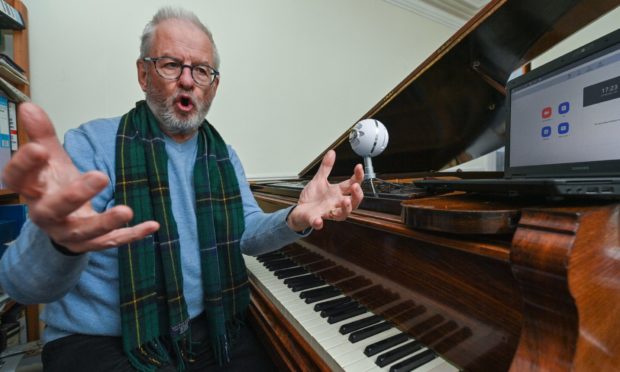Community music groups were forced to fall silent when lockdown restrictions put an end to the practice sessions and performances which had been their bread and butter for generations.
But some refused to go quietly into the night, and members adapted by using the internet to engineer group sessions even when performers were safely inside their own homes.
And now, almost one year on from the last physical get-together for groups, a study has revealed the enormous boost to members’ wellbeing such digital gatherings have had.
Investigating the effects of global online music-making throughout the pandemic, Edinburgh College of Art has found significant benefits when it comes to beating the lockdown blues.
Some groups across the north and north-east say that making music has helped keep their creative communities together.
Leader of The Forres Big Choir, Bill Henderson, said: “The music comes second, in a way it is just a means of bringing us together as a community.”
Having initially taken to using Zoom to collaborate with others at the beginning of the pandemic, Mr Henderson found his group’s numbers dwindling as many felt it just couldn’t compare to the real thing.
Instead, they decided just to meet for a chat over the online platform.
But, after months of getting used to the technology, members are now warming to it as a way of practising and have found new ways to sing as one.
Mr Henderson added: “It just wasn’t the same, a lot of our members are elderly and found it hard to adapt.
“However, we still meet up over it just to check in once a month – and now we have even started making music, some of which is even good.”
Recording their own performances at home, they have then been synced together in an audio visual performance to mimic being together as a choir.
Mr Henderson added: “While it isn’t the same and I was quite hesitant at first, everyone has enjoyed it and it shows off how good music is as a social tool – and the wellbeing benefits that come with it.”
In the study, academics examined the experiences of the Glasgow Improvisers Orchestra.
Monitoring sessions put on by the group, they noticed a boost in mood among those taking part.
The musicians also reported that the sessions gave them an opportunity for artistic development.
One group that has certainly found that to be the case has been the Bon-Accord Silver Band in Aberdeen, who are now preparing to compete in national championships at the Royal Albert Hall.
The group have beaten out competition from across the country to be named just one of three Scottish bands in the competition.
And with plans in place for lockdown to lift over the summer, they are optimistic about the chances of performing in London in October.
Covid restrictions permitting, they will go up against the very best that the UK has to offer in the hopes of snatching gold and becoming the best brass band in the country.
Band secretary Ann Murray said: “Music is always so beneficial and, in this moment in time, even more so as we can all make contact online and still play together.
“We can’t pretend that it is the same but the band is a big family so really playing together over Zoom has allowed us to all stay in touch and catch up.
“We are still hoping we can still play in October at the Albert Hall, which is one of the reasons we have kept these online rehearsals going.”
With three of the members having had children throughout the pandemic, band mates have had to meet their extended musical family virtually, something the group hopes will change soon.
Researchers in the study also said digital sessions tend to be more improvised, allowing musicians to be as creative as possible.
And, with people having more time on their hands than ever, collaborations in the digital music world have been more common.
Ms Murray added: “We have had the chance to play with a few specialists as they can’t go out and play normally either.”
Researchers say the results can help understand the benefits of online group music in providing emotional support – particularly for creative professionals who may have been adversely affected socially and economically by the pandemic.
